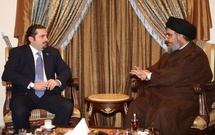
"How can we finance a tribunal that has turned into an Israeli-American tool attempting to sow discord in the country?," he asked. "We do not want Lebanon to fall victim to US interests in the region."
His comments came as Prime Minister Saad Hariri -- son of the slain ex-premier Rafiq Hariri -- ruled out any compromise on the Special Tribunal for Lebanon (TSL) which was set up in the wake of Hariri's 2005 assassination in a massive bomb attack.
"It is out of the question to forget the blood spilled by the martyr Rafiq Hariri," a communique issued by the premier's Future Movement said.
"We reject any compromise or attempt to do away with the tribunal."
The statement added that Prime Minister Hariri was keen on seeing the TSL conclude its investigation into the murder though he did not wish for that to plunge Lebanon into crisis.
Tensions over the tribunal have been growing steadily in recent weeks, raising fears of sectarian violence and the collapse of the national unity government, in which Hezbollah has two ministers.
The struggle pitting Hariri's Western-backed coalition against Hezbollah and its allies, backed by Syria and Iran, is over unconfirmed reports that the tribunal is set to indict Hezbollah members in connection with Hariri's murder.
Hezbollah has made clear it would not accept such an outcome, which various politicians have warned could lead to sectarian strife.
Ammar Moussaoui, in charge of international relations for Hezbollah, said Wednesday the tribunal represented a ticking "time bomb".
Christian deputy Sleiman Franjieh, a Hezbollah ally, has warned that if the court indicts members of the militant party, there could be a Sunni-Shiite war.
Syria and Saudi Arabia stepped in last week to calm tensions but observers say it is only a matter of time before the acrimony between the rival sides boils over.
Syrian Foreign Minister Walid Muallem, in an interview with the Wall Street Journal this week, also warned of sectarian strife while accusing the TSL of being irredeemably "politicised".
"We are convinced that a condemnation of the prosecutor of this court against Hezbollah will be a factor of disturbance in Lebanon," Muallem was quoted as saying.
Hezbollah and its allies have accused the tribunal of being part of an Israeli plot and of basing its investigation on testimony by "false witnesses".
Earlier this month, in a stunning reversal, Prime Minister Hariri said he had been wrong to accuse Syria for his father's murder.
His about-turn was seen as a sign of his coalition's weakness in the face of Syria's bid to regain influence over its smaller neighbour.
Hariri's murder forced Damascus to pull its troops from Lebanon following a 29-year presence.
Lebanon provides 49 percent of the funding for The Hague-based tribunal while other countries provide the remainder.
However, should Lebanon fail to honor its share of the funding, donor countries must cover the cost, according to the UN resolution that set up the court in 2007.
--------------------------------------------------------------------------------
His comments came as Prime Minister Saad Hariri -- son of the slain ex-premier Rafiq Hariri -- ruled out any compromise on the Special Tribunal for Lebanon (TSL) which was set up in the wake of Hariri's 2005 assassination in a massive bomb attack.
"It is out of the question to forget the blood spilled by the martyr Rafiq Hariri," a communique issued by the premier's Future Movement said.
"We reject any compromise or attempt to do away with the tribunal."
The statement added that Prime Minister Hariri was keen on seeing the TSL conclude its investigation into the murder though he did not wish for that to plunge Lebanon into crisis.
Tensions over the tribunal have been growing steadily in recent weeks, raising fears of sectarian violence and the collapse of the national unity government, in which Hezbollah has two ministers.
The struggle pitting Hariri's Western-backed coalition against Hezbollah and its allies, backed by Syria and Iran, is over unconfirmed reports that the tribunal is set to indict Hezbollah members in connection with Hariri's murder.
Hezbollah has made clear it would not accept such an outcome, which various politicians have warned could lead to sectarian strife.
Ammar Moussaoui, in charge of international relations for Hezbollah, said Wednesday the tribunal represented a ticking "time bomb".
Christian deputy Sleiman Franjieh, a Hezbollah ally, has warned that if the court indicts members of the militant party, there could be a Sunni-Shiite war.
Syria and Saudi Arabia stepped in last week to calm tensions but observers say it is only a matter of time before the acrimony between the rival sides boils over.
Syrian Foreign Minister Walid Muallem, in an interview with the Wall Street Journal this week, also warned of sectarian strife while accusing the TSL of being irredeemably "politicised".
"We are convinced that a condemnation of the prosecutor of this court against Hezbollah will be a factor of disturbance in Lebanon," Muallem was quoted as saying.
Hezbollah and its allies have accused the tribunal of being part of an Israeli plot and of basing its investigation on testimony by "false witnesses".
Earlier this month, in a stunning reversal, Prime Minister Hariri said he had been wrong to accuse Syria for his father's murder.
His about-turn was seen as a sign of his coalition's weakness in the face of Syria's bid to regain influence over its smaller neighbour.
Hariri's murder forced Damascus to pull its troops from Lebanon following a 29-year presence.
Lebanon provides 49 percent of the funding for The Hague-based tribunal while other countries provide the remainder.
However, should Lebanon fail to honor its share of the funding, donor countries must cover the cost, according to the UN resolution that set up the court in 2007.
--------------------------------------------------------------------------------









 Home
Home Politics
Politics









